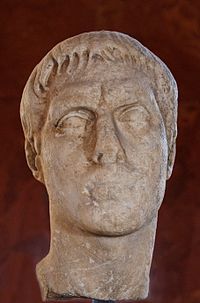Marcus Claudius Marcellus (Julio-Claudian dynasty)
| Roman imperial dynasties | |||
| Julio-Claudian dynasty | |||
 Marcellus, nephew and son-in-law of Augustus |
|||
| Chronology | |||
| Augustus | 27 BC – 14 AD | ||
| Tiberius | 14–37 AD | ||
| Caligula | 37–41 AD | ||
| Claudius | 41–54 AD | ||
| Nero | 54–68 AD | ||
| Family | |||
|
Gens Julia Gens Claudia Julio-Claudian family tree Category:Julio-Claudian dynasty |
|||
| Succession | |||
|
Preceded by Roman Republic |
Followed by Year of the Four Emperors |
||
Marcus Claudius Marcellus (42 – 23 BC) was the eldest son of Gaius Claudius Marcellus Minor, a former Roman consul, and of Octavia Minor, sister of Caesar Augustus, and hence was Augustus' nephew. He married the emperor's daughter Julia two years prior to his death, and served in that same year, 25 BC, under Augustus in Hispania alongside the future emperor Tiberius. He was given preference and so was elected at an unusually young age as a curule aedile, a magistrate's office, an honor Marcellus celebrated by presenting extraordinary public games (with Augustus' support). His ambitions are said to have brought him into conflict with Agrippa and with others: he is described as the presumptive monarchic heir of Augustus (though not by Augustus), or as his beloved nephew and son-in-law (though less preferred than Agrippa as heir). He died at c. 19 years of age, in Baiae, Campania, Italy, in 23 BC, and was buried in the mausoleum of Augustus, specific cause of death uncertain. His mother Octavia built a library in his honor, and Augustus' fondness was expressed in his funeral oration, and in naming a theatre and placing funerary statues of him (e.g., Marcellus as Hermes Logios). Though dying young and unproven, Marcellus' position led to his celebration by Sextus Propertius and by Virgil in the Aeneid.
Marcellus, born 42 BC, was the eldest son of Augustus's sister Octavia Minor and Gaius Claudius Marcellus Minor, a former consul, and hence Augustus's nephew. He was descended through his father from Marcus Claudius Marcellus, a famous general in the Second Punic War.
...
Wikipedia
